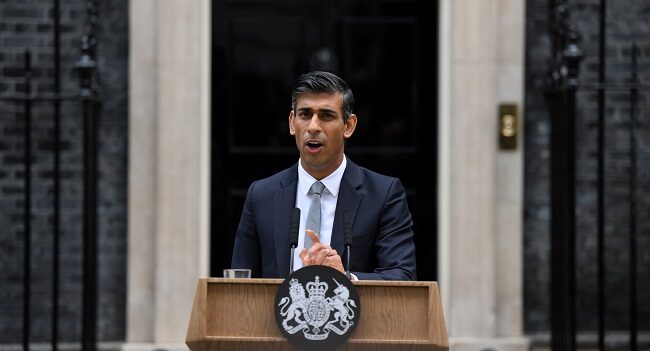Following a severe recession, the UK economy is recovering.

Britain's newly appointed Prime Minister Rishi Sunak gestures as he delivers a speech outside 10 Downing Street in central London, on October 25, 2022. - Rishi Sunak was Tuesday appointed as Britain's third prime minister this year, after outgoing leader Liz Truss submitted her resignation to King Charles III. (Photo by Daniel LEAL / AFP)
According to official figures released on Friday, the British economy recovered in January after narrowly avoiding recession in the fourth quarter amid skyrocketing prices.
The Office for National Statistics (ONS) reported that the gross domestic product increased by 0.3 percent as the services sector helped to offset weak performances in the manufacturing and construction sectors.
In December, the GDP fell by 0.5 percent as a result of extensive strikes by workers who were upset that their wages had not kept up with escalating inflation.
According to ONS head of economic statistics Darren Morgan, the economy somewhat recovered from the severe decline observed in December.
The return of students to the classroom following unusually high absence rates in the weeks leading up to Christmas, the Premier League (football) clubs’ return to a full schedule following the conclusion of the World Cup, and private health providers’ strong month were the main drivers of January’s growth.
“Postal services also made a partial comeback from the consequences of the strikes in December.”
Although Britain avoided a recession last year, the Bank of England predicts that it will continue this year.
Notwithstanding a recent decrease, the UK’s decades-high inflation has been a drag on output, which has also been hurt by rising BoE interest rates.
After contracting by 0.3% during the previous three months, the economy had zero growth in the last three months of 2017.
By definition, a technical recession is when the economy contracts for two consecutive quarters.
The economy had flat growth in the three months leading up to January, the ONS said on Friday.
Moreover, the GDP in January was unchanged from the same month a year earlier.
Even if a technical recession is avoided, this is consistent with the concept that the UK economy would contract overall this year, according to Hargreaves Lansdown analyst Sophie Lund-Yates.
“Unfortunately, the lesson for businesses is that things will continue to be very difficult, with stagnation a realistic scenario for some time,”
Meanwhile, it was projected that monthly GDP was O.2% below its pre-pandemic level.
One week prior to British Finance Minister Jeremy Hunt’s budget, Friday’s data was released.
In response to Friday’s figures, Hunt stated, “The UK economy has proven more resilient than many thought in the face of severe global challenges, but there is a long way to go.
“I will lay out the next phase of our plan to halve inflation, cut debt, and expand the economy — so we can raise everyone’s standard of life,” the president said.
The Russian invasion of Ukraine raised the price of food and energy last year, causing global inflation to reach its worst levels in decades.
Before declining to 10.1 percent last month, the UK Consumer Prices Index (CPI) reached a high annual rate of 11.1 percent in October.









[…] Also Read: Following a severe recession, the UK economy is recovering. […]